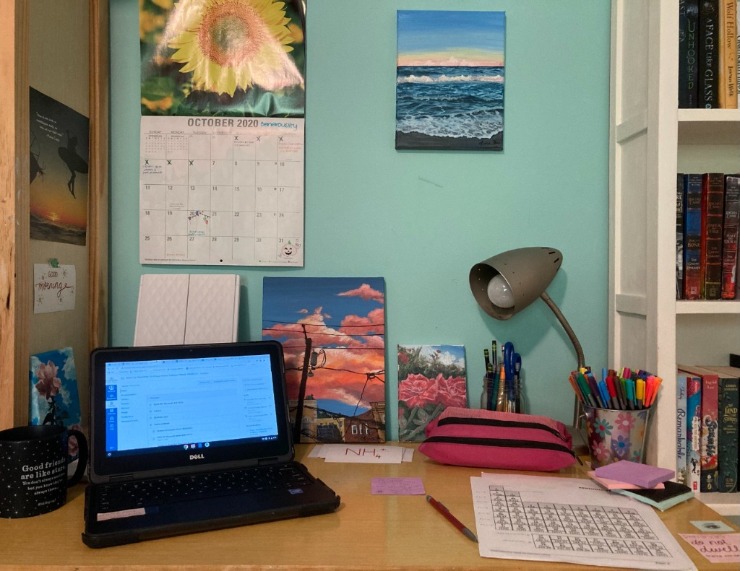On Sept. 23, the Chatham County Board of Education voted to continue the first semester of the 2020-2021 school year using Plan C, an entirely online instruction plan, for all high school students. The real question is, how do students feel about remaining virtual for the remainder of the year, and how will it potentially affect them?
Synopsis of Recent CCS Board Meetings & Decisions
The Risk of COVID-19 Transmission in Schools vs. The Need to Return to In-Person Instruction
NHS Student Body Opinion on CCS Decision
Concerns about Continuing Virtual Education
NHS Student Body Opinion on Remote Learning
Synopsis of Recent CCS Board Meetings & Decisions
In July of this year, the board had originally decided to operate under Plan C, voting against Plan A, a return of all students to school buildings with limited social distancing and other health precautions, and Plan B, a combination of online and in-person schooling, through the first nine weeks of school only. Almost a month later, the board planned to meet Sept. 17 to discuss a plan for students and staff returning to school buildings and present case statistics, possibilities for different instructional formats and the overall logistics of returning to school. The board then postponed their decision until they met again the following week, where its members ultimately decided it would be best to keep high school students and staff from the district virtual through January in order to optimize safety.
After meeting Sept. 29, however, the Board of Education voted to allow children of younger ages and their teachers to proceed with Plan B, a hybrid mix of remote and in-person instruction. Students in kindergarten through the second grade will be allowed to return to school two days a week starting Oct. 19, including some preschool and extended-content standards students. For those enrolled in the Chatham County Schools Virtual Academy, learning will continue fully online for the remainder of the semester. In addition, the board voted to allow student-athletes to begin attending workout sessions for high school volleyball and cross-country starting Oct. 7, with practices and games beginning Nov. 4.
In comparison to other NC school districts, the Chatham BOE’s decision for high schools to remain virtual until the new year isn’t one that came out of the blue. Chatham’s next-door neighbor, Wake County, made the decision to continue with remote instruction for high school students just a week before Chatham. As of Sept. 29, surrounding counties such as Orange, Durham and Chapel Hill/Carrboro are also planning to keep their high school students remote throughout the rest of the semester. All four districts plan to continue monitoring COVID-19 cases and rates to make necessary decisions or changes as things progress.
The Risk of COVID-19 Transmission in Schools vs. The Need to Return to In-Person Instruction
Those in favor of continuing remote learning argue that if staff and students were to return on-site, their safety would need to be guaranteed, as some parents are concerned about their children being exposed to the virus and the consequences of infection. According to a survey given Sept. 14-16, some teachers and staff also shared similar concerns of being exposed to COVID-19 themselves, and voiced that they weren’t fully comfortable with returning yet. Out of 1,500 responses, about 30 percent of staff were comfortable with returning to in-person instruction while 40 percent were uncomfortable with the idea. Another 30 percent were unsure. While the majority of responders were comfortable with returning to work on-site, relatively 25 percent wanted possible accommodations, about 5 percent said they would request leave, and another 5 percent said they would consider retirement or resignation.
“The goal of having children attend school in person–which is how they learn best–will only be safe when a community has the spread of the virus under control,” states the American Academy of Pediatrics, a professional association for American doctors specializing in children’s health. “And then, when it is possible to reopen a school for in-person learning, a layered approach is needed to keep students, teachers and staff safe.”
Those who oppose the decision to continue learning from home argue that it will be better for the students to have a learning environment in which they can speak face to face with a teacher, or socialize with peers. Others believe they simply learn better in a school environment and that going back to school would be better for their mental health.
“There are a lot of people that think…that we should be in school right now,” said Chatham County Board of Education Chairperson, Gary Leonard in an interview with The Chatham Record. “And I wish we were.”
NHS Student Body Opinion on CCS Decision
When surveyed about how Northwood students felt about Chatham County choosing to stay remote, opinions were split. While many felt relieved that they wouldn’t be returning to school quite yet because it wasn’t safe or ideal, others disagreed.
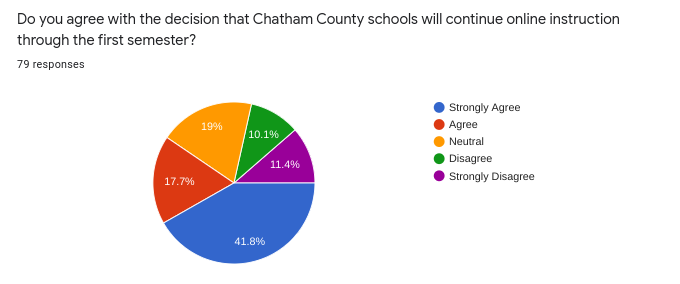
The majority of students who agree with Chatham County’s decision shared similar views regarding safety and feel it is important to do whatever it takes to keep their community safe.
“We are at a time in our country where there are a lot of unknowns, which is why I strongly agree that Chatham County Schools made the right decision,” said Northwood sophomore Lillian Jordan. “The health and safety of teachers and the student body is what needs to come first. Although it seems like forever since we were actually in school, one day we will all be back in person; it just needs to be safe in order for us to do that.”
While some supported the decision to stay home, there were others who felt Northwood should have returned to in-person learning on campus.
“Our schools are so much smaller than many others in lots of different counties, such as Wake County, that have already decided to go back,” said Northwood freshman Claire McLean. “If there [are] big counties [that] can go back to school, so should we. It is time to get everybody’s life back to normal. This has been going on for way too long.”
Others seem worried not just about the student body, but about staff who are at a higher risk from complications due to COVID-19.
“I agree with it [the decision to continue remote learning] because it makes me feel safe while still being able to get my education during a pandemic,” said an anonymous Northwood student. “Also, I am glad that this is something that we can do to keep the teachers safe, along with the administrators and the students at Northwood.”
Concerns about Continuing Virtual Education
Safety isn’t the only concern people have about education right now. By conducting school strictly via technology, there are concerns regarding overall health and the impact of perpetually looking at screens. Students are particularly worried about the effect online school is having on their mental health due to the lack of social interaction school provides and the change in learning environment.
“The education of students is most important, but mental health and home safety are equally important,” said an anonymous Northwood student.
The Centers of Disease Control and Prevention (CDC), the nation’s top health protection agency, agrees.
“In addition to a structure for learning, schools provide a stable and secure environment for developing social skills and peer relationships,” said the CDC. “Social interaction at school among children in grades PK-12 is particularly important for the development of language, communication, social, emotional, and interpersonal skills.”
In particular, Northwood students seem to be concerned about the lack of socialization, as the usual means of interaction and communication with peers have been drastically limited amidst the pandemic and social distancing orders.
“I’m happy that I don’t have to wake up early, but I’m missing the opportunity to meet the classmates I see everyday online personally,” said Northwood sophomore Willow Denuo. “It’s like the expression ‘together, but alone.’ Yes, we’re together, but we’re also in our own little worlds.”
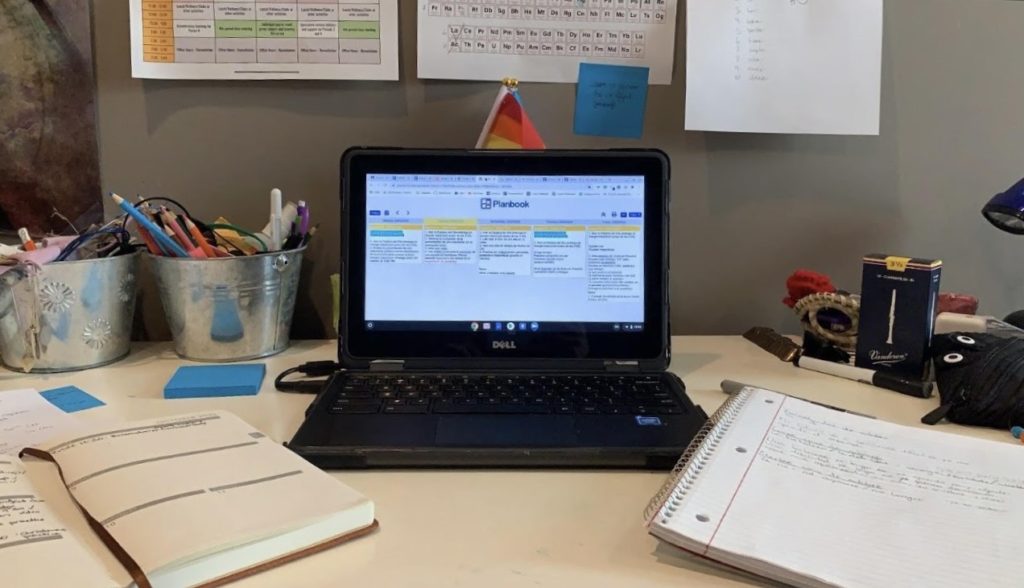
Another crucial concern for continued at-home online schooling is how it will disproportionately affect students of low-income families, minorities, and those with disabilities. A Harvard study found that when using an online math program called Zearn, low-income students were struggling more than their higher-income peers.
“Children in high-income areas experienced a temporary reduction in learning on this platform when the COVID crisis hit and schools shifted to remote instruction, but soon recovered to baseline levels,” said the Opportunity Insights Team in their study ‘The Economic Impacts of COVID-19: Evidence from a New Public Database Built from Private Sector Data.’ “By contrast, children in lower-income areas remained 50% below baseline levels persistently.”
According to the CDC, students with physical or learning disabilities may find online school more challenging due to its limitations and purely online format.
“Remote learning makes absorbing information more difficult for students with disabilities, developmental delays, or other cognitive disabilities,” said the CDC. “In particular, students who are deaf, hard of hearing, have low vision, are blind, or have other learning disorders (e.g., attention deficit hyperactivity disorder (ADHD) and other physical and mental disabilities) have had significant difficulties with remote learning.”
NHS Student Body Opinion on Remote Learning
When surveyed about their opinions regarding virtual learning as a whole, Northwood’s student body seemed to be somewhat evenly dispersed in their overall stance on virtual learning.
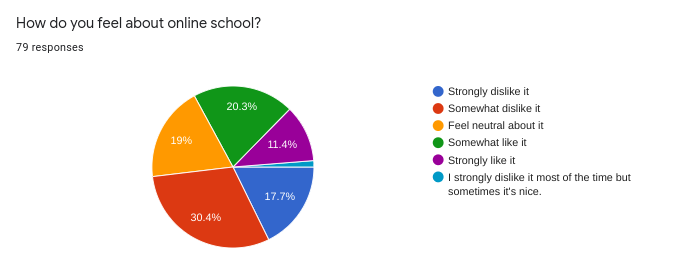
Several students expressed feelings that online school wasn’t as engaging, made learning harder or simply didn’t cater to their needs.
“Zoom isn’t really the same [as school] because people have internet issues,” said an anonymous Northwood student. “If you have ever tried to explain something over the phone or facetime, you have probably said the words, ‘it would be easier to explain to you in person.’”
“I feel like I’m not learning this year; I’m just trying to meet deadlines,” said another anonymous student.
Despite the abundance of setbacks and difficulties virtual learning has presented, some students have been able to find advantages among its differences, such as the ability to sleep in longer and work at one’s own pace through a more adaptable schedule.
“Online school gives us a chance to sleep in a bit, and it allows students to have flexible time to complete assignments and tests,” said an anonymous student. “We also get to have an hour lunch break which is nice.”
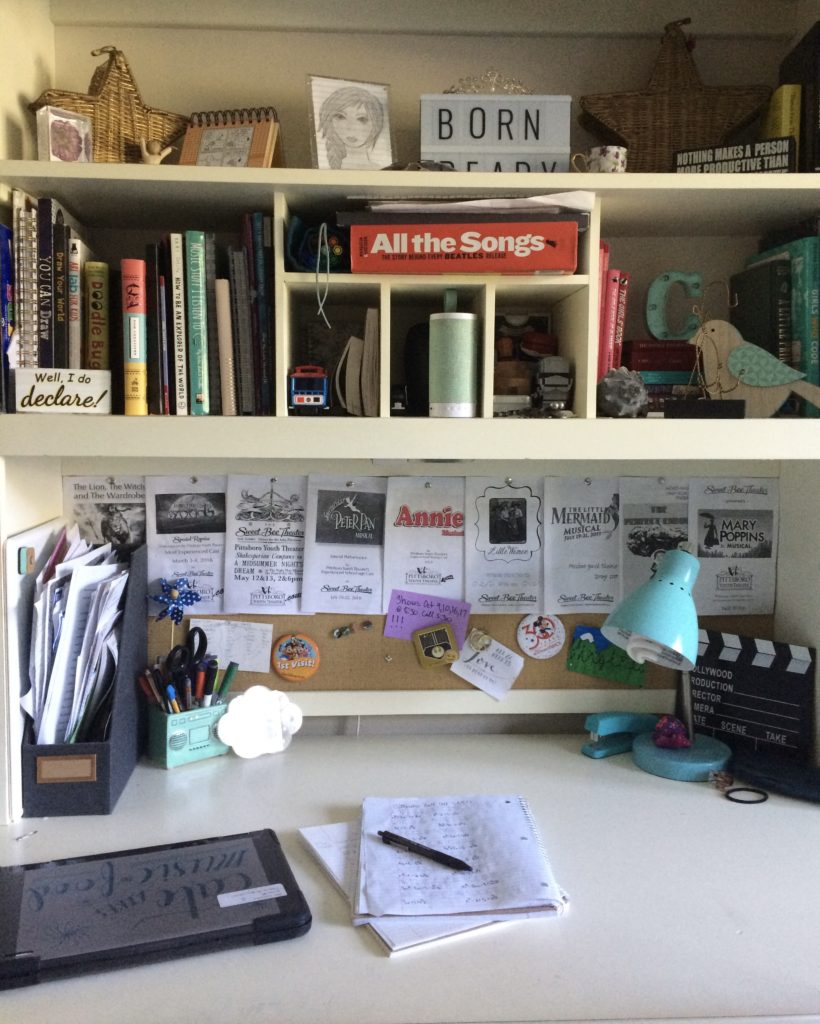
Others liked being fully online because it allowed more time for other activities and experimentation with different daily routines.
“Online school gives me the chance to stay safe during the pandemic [and] helps to keep my family and friends safe,” said an anonymous Northwood student. “I also like the fact that I can do my work more on my own time and [at my] own pace. I get to spend more time during the day doing other things that I enjoy because of the time that classes end. One thing that I do miss is seeing my friends every day. But I am able to talk to them over FaceTime, or outside at a good distance so we can all stay safe.”
Another student, Northwood senior Isabelle Snortheim, agrees.
“I like online school pretty well; my schedule is run more the way I like it and I get to work and go to my job a lot more than I would with regular school,” said Snortheim. “I also think that it prepares me for college more, with having the responsibilities of remembering things on my schedule.”
As of now, Northwood students will remain homebound until at least the start of the second semester.
“I think online school will definitely have a major impact on all students,” said Jordan. “We just need to hold our heads up and know that we are all in this together.”
-Olivia McMurray and Gianna Cacciato

